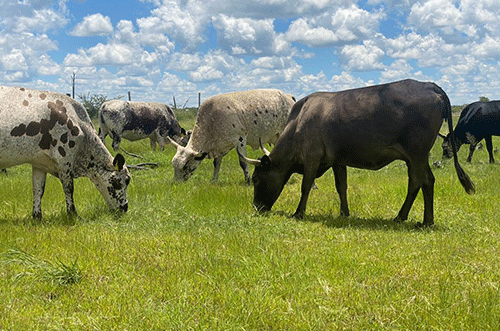Geoffrey Beau Kauta is one of the fiercest defenders of the Nguni cattle, and with good reasons too. The more than 20 years of exposure to the breed has made him an ardent lover of these cattle, and the fact that the Nguni is one of the hardiest cattle breeds has been a cherry on top of the cake.
Kauta, farms east of Gobabis in the Omaheke region. It is from here that he has managed to mould a Nguni stud that has weathered all storms, literally. His love for the Nguni, which many farmers have rejected based on stereotypes, did also not come naturally.
He had to do some digging to understand the dynamics of this breed, as he intended to make sure he chooses the right breed for his farming purposes.
«I had to research on what type of breed I should go with, as I wanted to balance out profitability with few input costs, he told AgriToday.
It was not difficult to determine which breed would comfortably tick the box on input costs. Nguni cattle are renowned for being adaptable and hardy and possess excellent resistance to internal and external parasites with natural immunity to tick borne diseases.
Namibia is the driest country south of the Sahara and this is what prompted me to look into what’s the best breed that produces a higher ratio of kg per hectare. This is undoubtedly the Nguni or the Sanga family of cattle,” he said
Kauta noted that being an indigenous breed, it was easy to choose the Nguni as it was also a breed he was exposed to at a younger age. Go back into history and you’ll appreciate that our grandfathers and grandmothers were able to raise bigger families with only cattle. I and a big part of my siblings (and when I say siblings I mean two to three soccer teams 30-40 children)were able to go to school and a big part of this was due to income generated from rearing the traditional cattle breeds or Nguni’s/Sanga as they are called,” he noted.
Nguni cattle derive their name from the black tribes of Africa, collectively known as the Nguni people. Nguni cattle descend from both Bos taurus and Bos indicus cattle and entered Africa around 8000 years ago.
The Nguni is a breed that has adapted to the African environment over many years and therefore displays functional characteristics. It is slightly smaller in size compared to the large beef breeds of other countries but this just enables it to live in the Highveld regions of Africa.
Bulls are medium sized and weigh between 500kg and 600kg. They are muscular and display typical male characteristics with well developed, muscular, cervico-thoracic humps, which mean that the hump is in front of the foreleg.
The cows are small and weigh between 300kg and 400kg. They are feminine with sleek, delicate lines around the neck and forequarter and a prominent wedge shape with the weight in the stomach and hindquarter area. The sloping rump is a distinctive characteristic of the Nguni cow and ensures ease of calving. The udder is small to medium, well attached with small, functional teats.
Their hide is sleek and glossy to prevent ticks from attaching itself to the animal. The legs and hoofs are strong to enable the animal to walk and climb to find enough grazing. The tail is thin and flexible with a full brush and extends to below the hock. The Nguni is known for its good temperament.
Nguni cattle are heat and light tolerant and can handle extreme heat and cold alike. Early maturity, fertility, ease of calving and longevity ensures that cows have long and productive lives, cows will produce 10 or more calves. The cows show great efficiency and often wean calves that weigh 45-50% of their body mass.
The average birth weight of calves is 22.5kg and wean at approximately 175kg, they grow at about 0.70 kg per day until weaning.
Nguni cattle are less prone to dystocia, this being ascribed to their sloping rumps, small uterus and low birth mass.
The Nguni can be fattened on natural grazing and performs well in the feedlot, producing quality carcasses with an even distribution of fat and excellent marbling, finished carcasses dress out at roughly 180-220 kg.
There’s no dispute that Nguni’s have a higher ratio than any other cattle breed in Namibia. They are also very protective of their young ones against predators, that’s why we do not dehorn them. This also is another economic factor in that you don’t spend money on dehorning equipment,” Kauta noted.
As a parting shot, the Nguni farmer said there’s a school of thought that if it wasn’t for the law, Nguni breeders would not be vaccinating against certain diseases as the breed is resistant naturally to some infections.
The love and passion for the breed is obvious, and so obvious too is Kauta’s belief in what the Nguni can do for him. Well, so far he has not been disappointed and he is determined to continue with his beloved Nguni for as long as it takes.
-tjatindi@gmail.com


